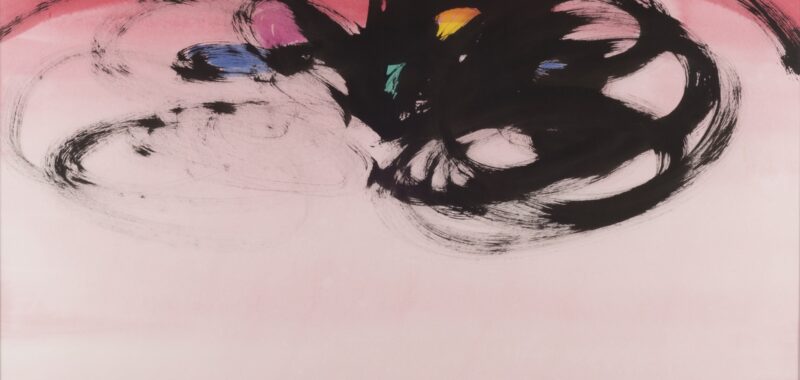“Creating is a process; it should be done for joy,” artist Rita Blitt told Hyperallergic in a recent video interview from her part-time studio space in Berkeley, California.
With a dynamic practice spanning nine full decades and mediums including painting, drawing, film, and sculpture, the Abstract Expressionist artist has certainly learned more than just a thing or two about forging a comprehensive oeuvre. Originally from Kansas City, Missouri, where she spends her time when she is not in California with her daughter, Blitt has dedicated her life to being an artist. Her thousands of works encompass large-scale public sculptures permanently installed across her hometown and as far away as Singapore and Australia; short films and documentaries merging her art practice with music and dance; and emotive paintings held in museum collections and private institutions globally, including the Skirball Cultural Center in Los Angeles, the National Museum of Singapore, the Nevada Museum of Art, the Spencer Museum of Art, the Nelson-Atkins Museum of Art, the Kemper Museum of Contemporary Art, and the Mulvane Art Museum at Washburn University.

Much of Blitt’s art has drawn inspiration from her family members, including her granddaughter and late husband, the natural environment, and the work of longtime collaborators such as choreographer David Parsons and composer Michael Udow. But her biggest and longest running influence is dance, which has been fundamental to her artistic identity since she was a child, when she would trace poetic figures onto frosted windows with her fingers and fill “ any piece of white space” she could find with her imaginative illustrations. To this day, her process of making art is full of movement and sweeping gestures created with her arms and body, akin to that of a conductor leading an orchestra.
At the Mulvane Art Museum, which holds more than 2,000 works by Blitt and has dedicated a gallery space in her name, several of her pieces are currently on view in the exhibition Women of Abstract Expressionism, up through February. The show situates her lifelong art practice in dialogue with that of mid-20th century Abstract Expressionist artists Elaine de Kooning, Helen Frankenthaler, Lee Krasner, and Joan Mitchell, arguably household names of post-war art history in the United States.


“I’ve known Rita quite a while now, and I’ve spent a lot of time with her work, but every time I look at it, I learn something new or I experience something new, so it’s been a bit of a journey,” Mulvane Art Museum Director Connie Gibbons, who curated Women of Abstract Expressionism, told Hyperallergic.
Gibbons explained that she read Mary Gabriel’s 2018 book Ninth Street Women, which delves into the works of Krasner, de Kooning, Mitchell, Frankenthaler, and Grace Hartigan, women painters whose contributions were historically overshadowed by those of Jackson Pollock, Willem de Kooning, Robert Rauschenberg, and other male artists.
The curator recognized commonalities between their practices and Blitt’s, who as a Midwestern artist “was doing a very similar thing … often in isolation” from New York City’s buzzing community.
Now in her 90s, Blitt is still creating work, finding inspiration every day. Her latest paintings, which feature a blending of color and flowing shapes on canvas, revisit her lifelong love for trees.
“Someone once said that an artwork isn’t finished until it’s viewed by others,” Blitt told Hyperallergic. “Perhaps that’s true, but sometimes it’s hard to share everything. People say, ‘Oh, [art] has to look like this, or it has to look like that.’ But I want them to know it’s about the joy of creating and having the courage to listen to their inner being.”




